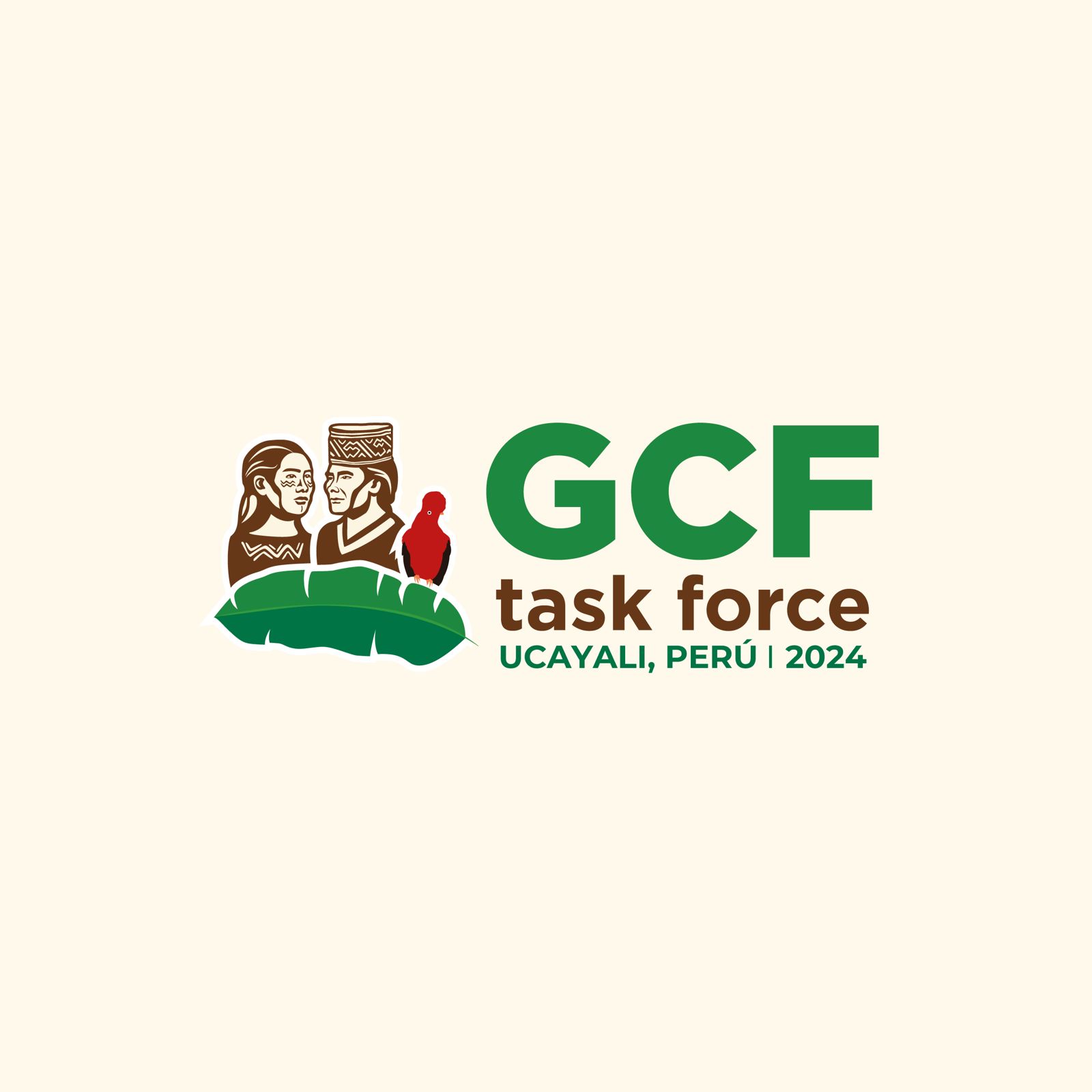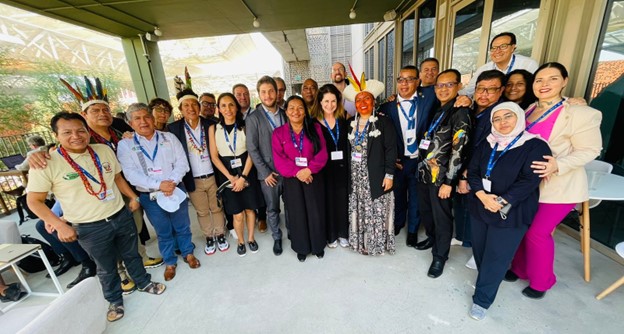Annual Meeting 2024
Pucallpa, Ucayali, Peru
Governors’ Climate & Forets Task Force

The 2024 Governors’ Climate and Forests Task Force (GCFTF) Annual Meeting, hosted by Governor Manuel Gambini Rupay, took place in Ucayali, Peru from October 7-11. This key event assembled hundreds of participants from local, regional, and global communities, including an important convening of Indigenous leaders and the GCFTF Global Committee of Indigenous Peoples and Local Communities. The focus was on advancing the New Forest Economy, with particular emphasis on innovative financing mechanisms aimed at supporting sustainable development.
The Regional Government of Ucayali prepared this excellent video introduction to the meeting!
The annual meeting built on our recent Technical Exchange, in Santa Cruz, Bolivia, a milestone of the co-design phase of the New Forest Economy focused on “Low-Emissions Development and Climate Finance to Reduce Deforestation of Tropical Forests and Achieve a Just Transition.” There, the GCFTF network attracted partners to establish flexible funding mechanisms that allow for locally-driven innovation and action on the ground. Make sure to the Annual Meeting’s Complete Agenda.
The Annual Meeting in Pucallpa advanced a Blueprint for advancing the New Forest Economy, and ensuring the needs, realities, and expertise of governmental leaders and their partners, from the private sector to Indigenous Peoples and local communities, are considered and incorporated.
See here for the detailed agenda! See here for a brief summary of meeting results.

Monday, October 7
IPLC Global Committee Meeting - by invitation only
The Governors’ Climate and Forests Task Force Indigenous People and Local Communities Global Committee will convene for an ordinary session, setting the stage for a week of important dialogues and decision-making. This ordinary session will build on recent meetings in Santa Cruz and in Dubai, focusing on building out a long-term strategy for the Global Committee and the Guiding Principles for Collaboration and Partnership Between Subnational Governments, Indigenous Peoples and Local Communities. Make sure to check our dedicated page for updates.
The Global Committee meeting has support from the GCFTF Global Secretariat and the Climate and Land Use Alliance (CLUA).
Annual Meeting Agenda Overview
Oct 8, People and Communities
A day-long Indigenous People’s Summit featuring presentations from the Grupo Peru and the Global Committee, with the contributions and insights of over 300 Indigenous participants from national and international backgrounds.
9:00am – 5:00pm: Session on Indigenous People – open to the public
2:00pm – 6:00pm: GCFTF Executive Committee meeting – by invitation only
Oct 9, Field visits
6:00am – 3:00pm: Field visits with selected experiences – open with previous registration
Oct 10, Connecting partners
The GCFTF’s General Assembly (Business Meeting) gathers for its session to deliberate on strategic directions and upcoming initiatives.
9:00am – 5:00pm: GCFTF General Assembly (“Business Meeting”) – by invitation only
9:00am – 5:00pm: Exhibition tables – open for all participants
9:00am – 5:00pm: Bilateral session among partners – by invitation only
Oct 11, Open sessions
9:00am – 5:00pm: Open Session to the general audience – open to the public
Deep dive on the field visits
Participants will have the opportunity to choose from several distinct routes, each showcasing different aspects of sustainable development and forest management in Ucayali. These field visits aim to provide a hands-on learning experience, highlighting both challenges and successes in the region. The following routes are available:
1. Entrepreneurship Route: Indigenous Youth and Local Communities
This route offers an immersive experience with local indigenous communities, focusing on youth entrepreneurship and community-led initiatives. Participants will visit agro-tourism sites, a native community, and an innovation center supporting indigenous enterprises in areas like basket weaving, camu camu production, and aquaculture.
2. Transformation Route: Sustainable Palm
Explore how palm oil production can transform local economies while adopting sustainable practices. The visit will highlight the Central Committee of Palm Growers of Ucayali’s (COCEPU) success in transitioning from coca to palm oil, showcasing circular economy practices, oil processing plants, and sustainable agroforestry systems.
3. Cooperation Route: Cocoa and Forests
Discover how cocoa production is integrated into agroforestry systems, particularly in areas formerly used for coca cultivation. Participants will visit cooperatives like Colpa de Loros, learning how they combine cocoa cultivation with forest conservation and local community involvement, including women’s roles in the cooperative.
4. Route of the New Forest Economy: Fruits of Biodiversity
Indigenous Peoples play a crucial role in conserving forests and utilizing native biodiversity. This route features visits to communities managing species like Aguaje and Ungurahui. Participants will see how forest fruits are sustainably harvested and transformed into high-value products, with an emphasis on agroforestry and local entrepreneurship.
5. Value-Added Generation Route: Wood
Ucayali’s indigenous communities are pioneers in certified timber production. This route will demonstrate the journey from sustainable forest management to value-added wood products, visiting processing plants and exploring public procurement initiatives that promote certified wood for school furniture and other uses.
6. Restoration Route: Landscape Recovery and Ecosystem Services
Witness the restoration of a 500-hectare forest landscape, once degraded by agriculture and cattle ranching. Participants will see how reforestation efforts have revived the area, restoring biodiversity and ecosystem services, and visit aquaculture and livestock projects aimed at creating sustainable economic alternatives for local communities.
7. Certification Route: Certified Palm (RSPO)
This route focuses on certified sustainable palm oil production. Participants will visit the facilities of APROMAN and local processing plants to learn about best practices in sustainable palm cultivation and the economic benefits of RSPO certification.
8. Conservation Route: Private Conservation Area
Visit a private conservation area accessible by boat, rich in biodiversity and home to numerous wildlife species. This area serves as a model for nature tourism and forest conservation, highlighting sustainable practices in both wildlife rescue and camu camu production by local communities.
The field visits are a key component of the GCFTF Annual Meeting, providing participants with the opportunity to experience the innovative projects that are transforming the Amazon region. From sustainable palm production and forest restoration to indigenous entrepreneurship and certified timber, these site visits will showcase the real-world impact of the New Forest Economy in action.
For more details or to inquire about the field visit schedule, please contact us at martha.gtzfontes@gcftaskforce.org
